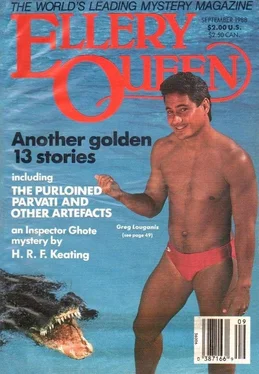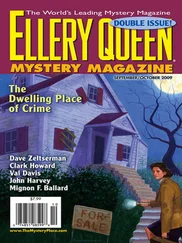“You’ll lose your hot water,” Sussock told her.
She smiled and went to the shower and wound the silver knob into the wall. “You’ve been known to call at more convenient times,” she said.
“I’ll leave if you like.” Sussock stepped inside and shut the door behind him.
“No, you won’t.” She slipped his jacket off his shoulders and pecked his cheek. “Now you’re here, you’ll stay.”
He held her about the hips. “I can’t stay that long. I’m at work. I’m just observing the old Glasgow tradition of dropping in on folk.”
“Well, just drop into the chair in the living room, old Sussock, and I’ll fix you a coffee.” She turned. Then she turned back. “Is that all I mean to you? Just someone to drop in on?”
He smiled. “I’ve come out of my way to see you. I should be rushing back to Donoghue with information, but I’m here.”
“I saw the paper,” said the sobbing woman. “I know he’s a violent man, I know he’s a bad swine when he’s got a drink in him, but I didn’t think he’d do anything like this.”
“Yes, madam.” Donoghue pinned the phone between his ear and shoulder while he struggled to free his ballpoint from the spine of his notepad. Then he asked, “Are you still there?”
Silence.
“Madam?”
“Yes—” She was fighting back emotion. “I’m still here.”
“You saw the paper — you mean the Evening Times?”
“Yes, the early edition — about the man who was stabbed to death.”
“Yes?” Donoghue coaxed. “Don’t hang up — in the name of heaven, don’t hang up—”
“My husband. It — was my husband.”
“Can I have your name, madam?”
“Mrs. Muirhead. Bogbain Road, Castlemilk. My husband is at home at the moment. He’s a violent man.”
“You’re not in your home at the moment?”
“No, I’m phoning from a neighbor’s.”
“We’ll be coming to arrest your husband on suspicion. It’s up to you whether you want to be there or not.”
“I’d rather not. My kids are here with me. Just don’t tell him I shopped him.” She hung up.
As Donoghue put the phone down, Sussock tapped on the door and entered Donoghue’s office. “I have a name and address,” said Sussock triumphantly.
“Muirhead — Bogbain Road, Castlemilk,” said Donoghue.
“How did you know that?” Sussock asked. Then belatedly added, “Sir.”
Donoghue and Sussock drove to Bogbain Road in Castlemilk. A patrol car with two uniformed officers followed in close company. Castlemilk sprawled over the hillside, a postwar project of high-rises and low-rises, densely packed. It is in terms of its population the largest housing scheme in Europe. Donoghue drew his Rover to a halt outside the address in Bogbain Road. It was an appropriate name for the road, he thought, as he negotiated the dog excrement on the footpath beside the untended front garden. The Muirheads lived two up left on the urine-stenching, graffiti-covered stairs. Donoghue rapped on the door.
It was opened by a well built man in his thirties, dressed in Army fatigues.
“Police,” said Donoghue. He flashed his I.D.
“You didn’t waste any time,” said the man. He showed not the slightest hint of violence, and Donoghue knew instantly that there would be no resisting of arrest.
“So you know why we’re here?” Donoghue asked.
The man said nothing, just turned and walked back inside the dimly lit flat. Donoghue, Sussock, and the two uniformed constables followed.
The living room of the flat was more in keeping with an Army barracks than a family home. There was little evidence of a wife and children living there, but plenty of evidence of a soldier — camouflage jackets, books, bayonets, knives, maps, compasses, everything short of a firearm.
Muirhead stood facing the policemen, deferential to authority, but the sort of man who would, thought Donoghue, lay down the law to his wife and children. “I’m in the Territorial Army,” he explained. “More or less full-time since I lost my job.”
“So which knife did you kill him with?” said Donoghue.
“That one,” said Muirhead, with a sudden frankness that disarmed the four men.
“We’ll have to take you in,” said Donoghue.
Sussock picked up the commando knife to which Muirhead had pointed. “Why did you kill him?”
“He killed my child.”
“There may have been a good reason for that.”
“Look, my wife is sick, I can see that. She sees our doctor for depression. She’s not in a fit state to decide whether she wants a child or not. He should have seen that. He had no right to pull my life out of her and throw it in an incinerator. That was my child — it wasn’t his life inside her, it was mine. He had no right to keep me in the dark.”
“You complained. That should have been enough.”
“It did no good. The medical people, they just cover up for each other.”
“So you killed him.”
“Aye. Wouldn’t you?”
“No.”
“I found out where he lived and I waited in the shrubs. I waited a long time. I’ve been trained in certain things. I went there late Saturday and waited. I didn’t get a chance to move until yesterday afternoon. Lying still for nearly twenty-four hours was tough, but I’m a warrior — I do what I need to do. When it was clear he was alone I went up to the door, rang the bell, pushed my way in when he answered it, and stuck him like a pig. He ran to the dining room, bleeding. I followed and made sure he knew who I was and why I was going to kill him. A life for a life, I said. Then I started to puncture him, around the heart. I’m a killing machine when I want to be. I’ve been trained like that.”
Later, Donoghue bought Sussock a beer in a bar.
“It’s never really cut-and-dried, is it, Ray?” he said, handing the older man his drink. “If he pleads guilty due to diminished responsibility, he’ll be out in three years. Good health.”












